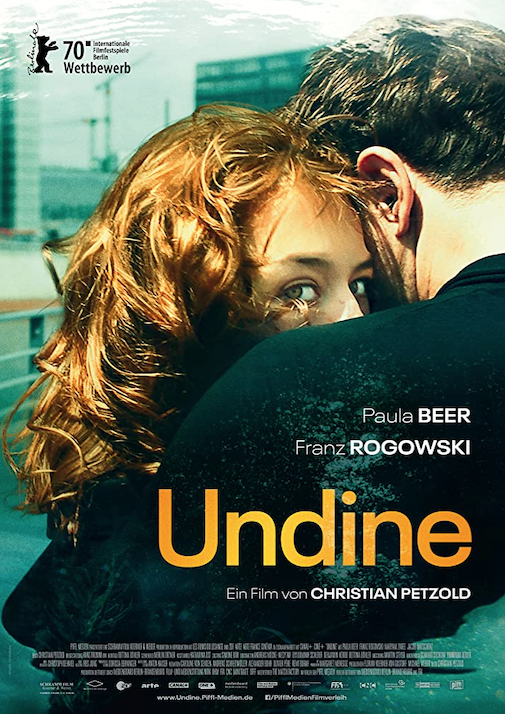 Coverage from the 56th annual Chicago Film Festival
Coverage from the 56th annual Chicago Film Festival
by Nick Taylor
Undine opens immediately after the titular character (Paula Beer) has been told by her boyfriend Johannes (Jacob Matschenz) that he’s leaving her for another woman. Seated at an outdoor café, Beer’s expression remains piquant and internalized as Johannes explains himself, half listening to him talk and half deciding how to respond. When she makes up her mind, she informs Johannes they’re still in love, and if he’s not at the café when she gets back from work in half an hour she’ll kill him. He’s not there, obviously. But after hearing an unexpected figure call out her name, she meets a man named Christoph (Franz Rogowski). The two are instantly captivated by each other, and their meet-cute is so strange, heartfelt, and semi-chaotic I’d hate to spoil it. It might be the best scene in the film...
The latest film by Christian Petzold, Undine thrives on conjuring inexplicably lovely moments from within an aura of dread and uncertainty. Sometimes that moment is when Christoph, a professional diver, comes face-to-face with a catfish so huge his coworkers don’t believe he saw it until they check his camera. Sometimes it’s Undine and Christoph cramming full conversations into the 20-second window from when one of them boards their train home til the door closes, like lovestruck teenagers. They become the center of each other’s worlds so rapidly, blotting out most other parts of their lives, you might wonder how much time has passed from one scene to the next. Hans Fromm’s cinematography, conspiring with Bettina Böhler’s editing and sound design, are major assets in achieving this tension, giving Undine a sinuous, otherworldly momentum that never overrides its central romance.
Still, by the time their relationship is put in dire straits about an hour into this 90 minute film, it’s hard to pin down what Petzold wants this to be about. Part of the problem is that Undine's last 20 minutes feel so inconsequential to the story it was telling (which is a shame, since the ever-reliable Rogowski leads here), but this doesn’t solely explain how monotonous it ultimately feels. Kudos to Petzold and his artists for crafting such a genuinely distinct, unusual tone, but it loses layers in failing to gratify scene-specific nuances as the stakes grow more intense.

The most damning example of this is Undine’s threat to kill Johannes, which hangs over the film as her relationship with Christoph becomes more all-consuming. It’s a time bomb we’re left wondering if Petzold will detonate, yet when Undine makes her play the scene holds no meaningful modulations in tone or performance, especially the latter. Everything we come to intuit about Undine rests squarely on Petzold’s shoulders, while Beer spends most of the film wearing a variation of the placid, semi-inscrutable expression she had at the opening. She cottons to Undine’s weird mood better than she did Transit’s, but in a part with far more material for its actress, Beer again does almost nothing meaningful to deepen her characterization. Anne Ratte-Polle is unexpectedly memorable at the film’s edges as Undine’s boss, going full Polly Draper in Side Effects and adding more textures to her two scenes than Beer achieves in over an hour of moonish staring, water-based magicks, and tour-guide lectures on German architecture.
So, pine for Nina Hoss. Pine for a better, more hypnotic film. Normally I’d probably try to make this more apt by linking pinning as Undine’s final thesis, but if it had an ending note that strong I probably wouldn’t be as underwhelmed as I am.
Final Grade: A watery B-
Available to stream in the Midwest through Chi Fest until October 25th